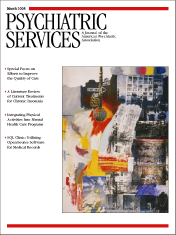Association Between Community and Client Characteristics and Subjective Measures of the Quality of Housing
Abstract
OBJECTIVE: The objective of this study was to examine the relationship between subjective perceptions of the quality of housing among mental health consumers and both client characteristics and objective measures of the client's neighborhood. METHODS: A cross-sectional survey of a random sample of 468 male clients who were recruited from three mental health centers in Connecticut was used to assess client characteristics, including sociodemographic and clinical status, and measures of subjective quality of housing that reflected perception of both the client's residence and the neighborhood. Data describing the objective characteristics of the 233 census-tract block-group neighborhoods in which clients lived were obtained from the 2000 decennial census, from which three measures were created by using principal components analysis: average household income, affordability, and availability of plumbing and cooking facilities. Ordinary-least-squares regression analyses were used to identify client and neighborhood correlates of subjective quality of housing. RESULTS: Neither psychiatric diagnosis nor substance abuse were found to be significantly associated with any of the subjective housing quality measures. Clients who were living in their own place with others, those who were less bothered by side effects of medications, and those who were living in higher-income neighborhoods were more satisfied with the overall quality of their housing. CONCLUSIONS: Client assessments of subjective quality of housing, both overall and along specific subdimensions, are largely independent of commonly used diagnostic and symptom measures of mental health status. Consumers' subjective experience of housing quality are significantly associated with objective measures of neighborhood characteristics, particularly the mean household income of the neighborhood.



